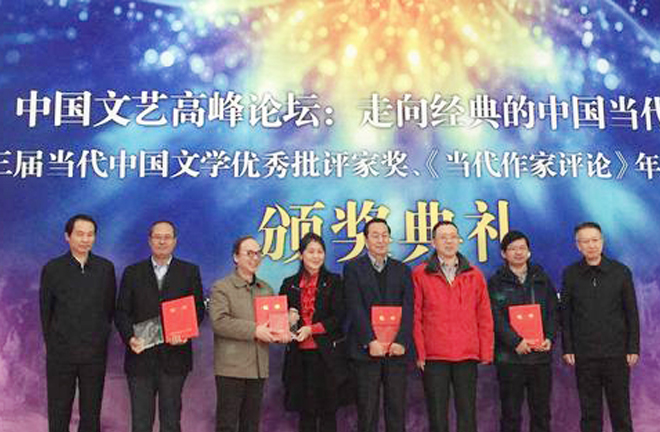Forging an original Chinese contemporary literary theory

The Third Award of Excellence for Contemporary Chinese Literary Critics was held to encourage the development of Chinese literary criticism. Photo: FILE
In recent years, great progress has been made in Chinese contemporary literary criticism. However, there is still a lack of important theoretical innovation.
Gao Jianping, a research fellow at the Institute of Literature at the Chinese Academy of Social Sciences, said that there are largely two schools for building China’s own contemporary literary criticism: one is the supporter of a binary opposition between China and the West, which is further divided into the school that follows classical Chinese literary theory and the school in favor of the dominant Western theories. The other is the supporter of overcoming the binary opposition in face of contemporary reality. It insists that “the ancient benefits the present, the foreign benefits China and the past benefits the new.”
Qiao Huanjiang, a professor at the College of Humanities and Communication at Hainan University, said that under cultural studies and critical theory, texts are no longer seen as a form of writers’ self-expression, the reflection of reality or a closed system, but as a representation of discourse embedded in historical reality. This makes history reappear in criticism in a socially problematic way.
Gao added that when constructing China’s original literary theory, it is most important to link theory with practice, namely, with the reality of literary criticism. In the past, we have only analyzed the terminology used in literary criticism. We can use the knowledge of psychology, sociology, political science, anthropology and other disciplines to conduct a more in-depth study of literature from multiple perspectives.
Qiao said that as the boundaries between disciplines and between academic discourse and historical reality are increasingly blurred, contemporary literary criticism can neither be a footnote of existing theories nor too fanciful. On the contrary, it should fuse original literary theory with functionality.
Yang Qingxiang, deputy dean of the School of Liberal Arts at Renmin University of China, said that the main function of original theory is to provide a theoretical framework for interpretation. In other words, it can help us better interpret literary works and conduct social analysis. At present, the original Chinese literary theory is not systematic enough and lacks theoretical self-consciousness.
To establish the system of original theory, we must act with the principles of selective appropriation, trial testing and independent innovation. Selective appropriation is the adoption of foreign theories that are useful to us. Trial testing is the testing of the introduced theory through current practice. Independent innovation is to transform foreign and ancient Chinese theories based on previous practice, Gao said.
Qiao added that as for the theoretical originality of contemporary Chinese literary criticism, there are two key points: First, we should take note of the dialectical thinking on the relationship between world historical processes and China’s value orientation. This includes not only the reorientation and exploration of Chinese literary theory, but also an appropriate critical reflection on Western theories. Second, the new media environment and artificial intelligence have brought about great changes in the current literary field. This requires literary production to have full self-awareness of the new social and historical situation.
Yang said that building an original contemporary literary theory in line with Chinese history, society and aesthetics requires us to more consciously look for an original theoretical framework and strengthen the study of its methodology and epistemology. Under the current social and cultural circumstances, only by continuous innovations in epistemology and methodology can we better explain current literary phenomena.
Over the past 40 years, the theory of Chinese literary criticism has gone through the process of studying “external law” to “internal law.” External law refers to the relationship between literature and superstructure, namely, the connection between literature and economy, society, politics and culture. Internal law includes the study of the image and techniques of expression used in literary works and the perspectives, characters, metaphors and symbols involved in narrative works. Gao said that the development of literary theory has prompted us to integrate external law and internal law.
edited by YANG LANLAN
